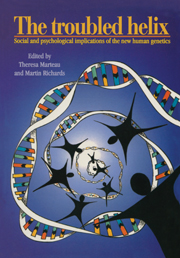Book contents
- Frontmatter
- Contents
- List of contributors
- Preface
- Preface to the paperback edition
- Acknowledgements
- Part I Personal stories
- Part II Clinical context
- Part III Social context
- 9 The troubled helix: legal aspects of the new genetics
- 10 Human pedigree and the ‘best stock’: from eugenics to genetics?
- 11 Public understanding of the new genetics
- 12 Families, kinship and genetics
- 13 Ethics of human genome analysis: some virtues and vices
- 14 Genetics and racism
- 15 Predictive genetics: the cultural implications of supplying probable futures
- 16 The new genetics: a feminist view
- 17 Afterword
- Index
14 - Genetics and racism
from Part III - Social context
Published online by Cambridge University Press: 01 June 2011
- Frontmatter
- Contents
- List of contributors
- Preface
- Preface to the paperback edition
- Acknowledgements
- Part I Personal stories
- Part II Clinical context
- Part III Social context
- 9 The troubled helix: legal aspects of the new genetics
- 10 Human pedigree and the ‘best stock’: from eugenics to genetics?
- 11 Public understanding of the new genetics
- 12 Families, kinship and genetics
- 13 Ethics of human genome analysis: some virtues and vices
- 14 Genetics and racism
- 15 Predictive genetics: the cultural implications of supplying probable futures
- 16 The new genetics: a feminist view
- 17 Afterword
- Index
Summary
Introduction
Advances in scientific or technical knowledge are often accompanied by a concern about how the new knowledge will disrupt the existing moral order. The moral value of scientific knowledge depends on the use to which it is put, and the historical precedence of the abuse of theories of inheritance against various groups of people, including those distinguished by their ethnicity, has brought an urgency to concerns as to how the new genetics might be used against people. The continuing intolerance towards people of different ethnicities and religions, illustrated by the recent conflicts in Rwanda and the former Yugoslavia, indicates that the end of the Nazi regime in Germany did not mark the end of inter-ethnic genocide. The study of inheritance and human populations, since the Nazis were defeated in World War II, is often portrayed as neutrally progressing towards a ‘truth’, and not as an activity that has political implications. Decisions made about the type of research work to fund, what becomes defined as a clinical problem and the ends to which results are put, are guided by forces that are political in nature. An outcome of the supposedly neutral scientific research process, on which this chapter will focus, is the castigation of particular sections of society, because their habits, such as marriage patterns or diet, do not conform with what is considered to be genetically sound.
The ways in which genetics may be used against ethnic minority groups in the industrialised nations is not an ‘ethnic minority problem’, but a problem of the dominant ethnic group.
- Type
- Chapter
- Information
- The Troubled HelixSocial and Psychological Implications of the New Human Genetics, pp. 295 - 316Publisher: Cambridge University PressPrint publication year: 1996
- 10
- Cited by



